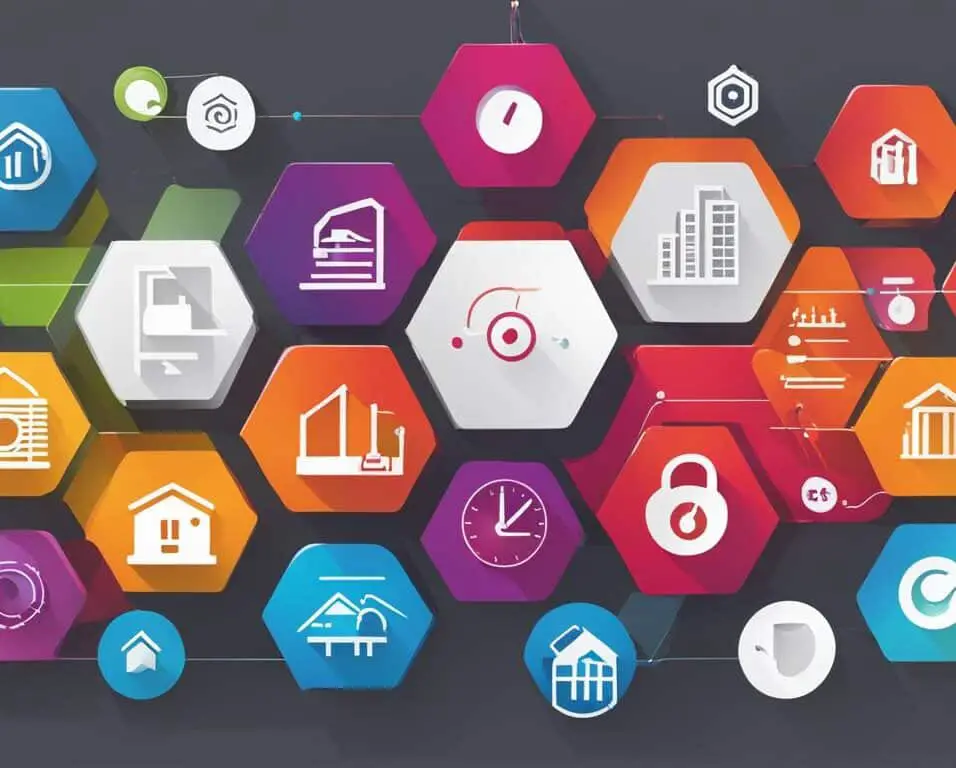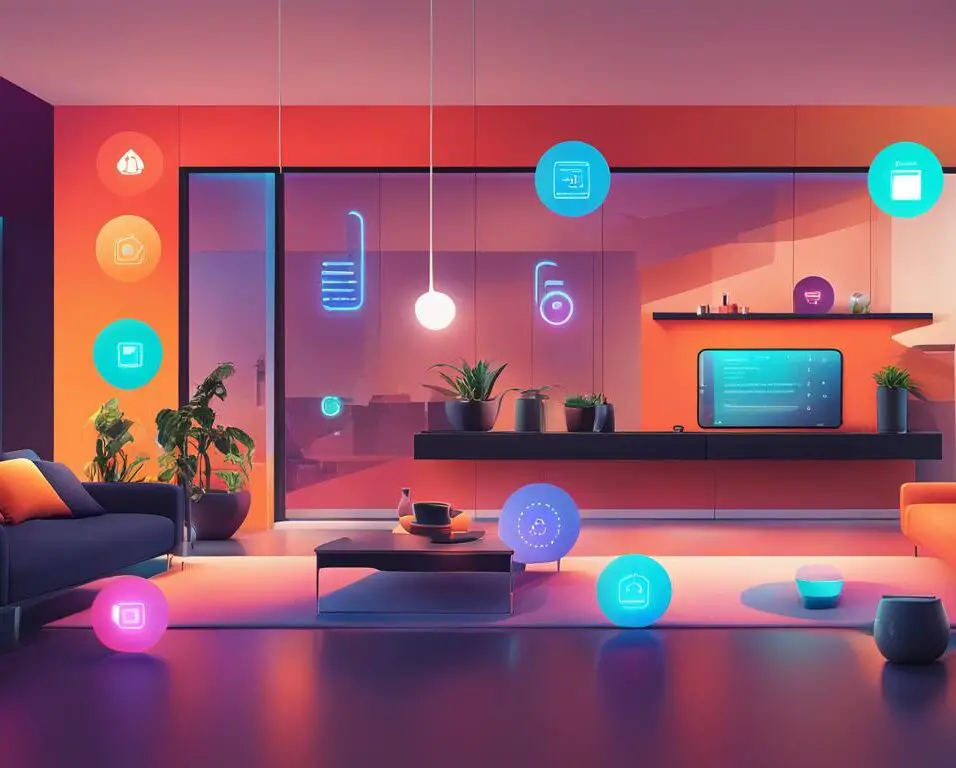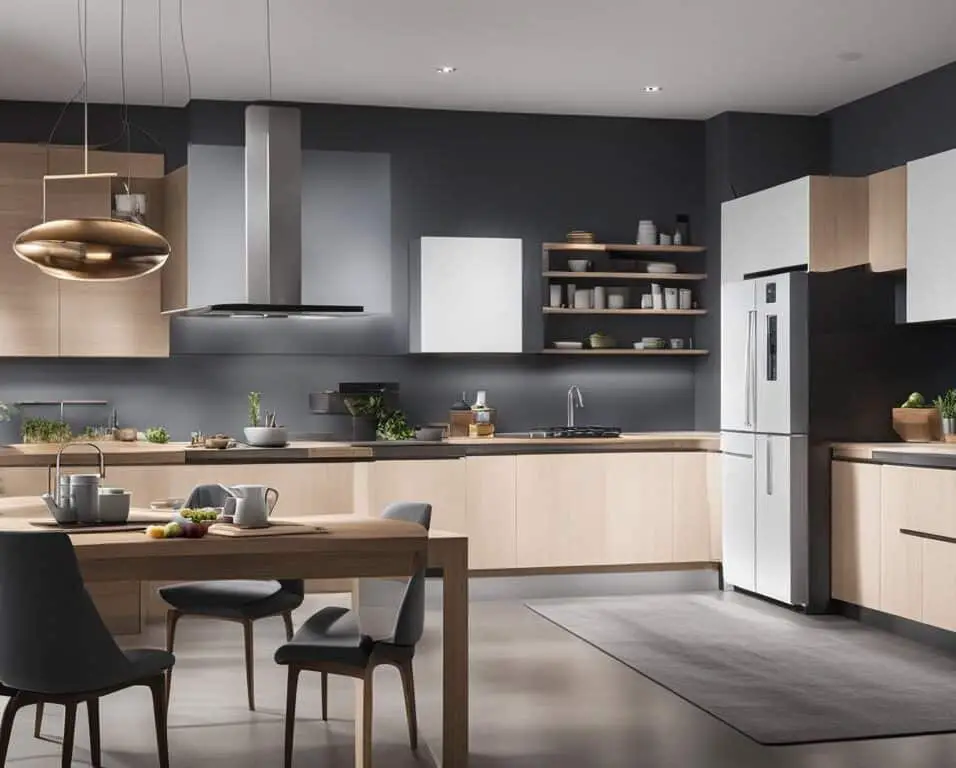The Role of AI in Home Automation Advancements
The advancement of technology has revolutionized the way we live and interact with our homes. The emergence of AI and Automation has transformed our homes into smarter living spaces. AI-powered virtual assistants, such as Amazon’s Alexa and Google Assistant, have become integral parts of many households, allowing homeowners to control and manage their connected devices through voice commands. AI also enhances home security systems by providing advanced threat detection and automated responses. Additionally, AI algorithms optimize energy consumption, leading to more efficient energy management in our homes. The future of home living holds exciting possibilities, including increased personalization, health and wellness integration, and AI integration with everyday appliances.
Key Takeaways:
- AI-powered virtual assistants like Alexa and Google Assistant allow homeowners to control connected devices with voice commands.
- AI enhances home security systems with advanced threat detection and automated responses.
- AI algorithms optimize energy consumption for more efficient energy management.
- The future of home automation includes increased personalization, health and wellness integration, and AI integration with everyday appliances.
The Growth of AI in Smart Home Automation
The global smart home market is expected to reach a value of $135 billion by 2025, driven by the proliferation of AI-powered smart home devices. AI technology has revolutionized home automation, making it more intuitive, personalized, and efficient.
The increasing number of connected devices, enabled by the Internet of Things (IoT), has contributed to the growth of AI in smart home automation. These devices seamlessly integrate with AI-powered virtual assistants, offering homeowners enhanced convenience and control over their connected devices.
| Key Factors Driving the Growth of AI in Smart Home Automation | Benefits |
|---|---|
| 1. Proliferation of AI-powered smart home devices | – Intuitive and personalized home automation |
| 2. Increasing number of connected devices through IoT | – Enhanced convenience and control |
| 3. Integration with AI-powered virtual assistants | – Seamlessly manage connected devices |
With the continued growth of AI in smart home automation, homeowners can enjoy the benefits of an interconnected and intelligent living environment, improving their quality of life and creating a more efficient and comfortable home.
Future Trends in AI-Driven Smart Home Automation
Looking ahead, AI technology will continue to reshape the future of smart home automation. Emerging trends include:
- Increased personalization through AI algorithms learning individual preferences
- Integration of health and wellness features for a holistic living experience
- Deeper integration with everyday appliances for seamless automation
As AI advances and becomes more pervasive, the possibilities for smart home automation are limitless, offering homeowners a truly connected and intelligent living environment.
Benefits of AI in Home Automation
AI brings numerous benefits to home automation systems. With the ability to analyze data and learn patterns, AI technology enhances our living spaces with personalized experiences and tailored automation routines. By incorporating AI into home automation, homeowners can enjoy the following advantages:
1. Personalized Experiences
AI algorithms analyze user data and behavior, allowing smart homes to adapt to individual preferences. This enables personalized experiences, making homes more comfortable and intuitive.
2. Hands-Free Control
AI-powered virtual assistants, such as Amazon’s Alexa and Google Assistant, provide convenient hands-free control over smart devices. By simply using voice commands, homeowners can easily manage their connected devices, creating a seamless and effortless experience.
3. Energy Efficiency
Energy management systems integrated with AI algorithms optimize energy usage in smart homes. By analyzing energy patterns and factors such as occupancy and usage, AI technology can automatically adjust settings to maximize energy efficiency, leading to cost savings and reduced environmental impact.
4. Enhanced Security
AI enhances home security systems by providing advanced features like facial recognition and real-time alerts. AI-powered cameras and sensors can identify and differentiate between authorized individuals and potential threats, enhancing the overall safety of the home.
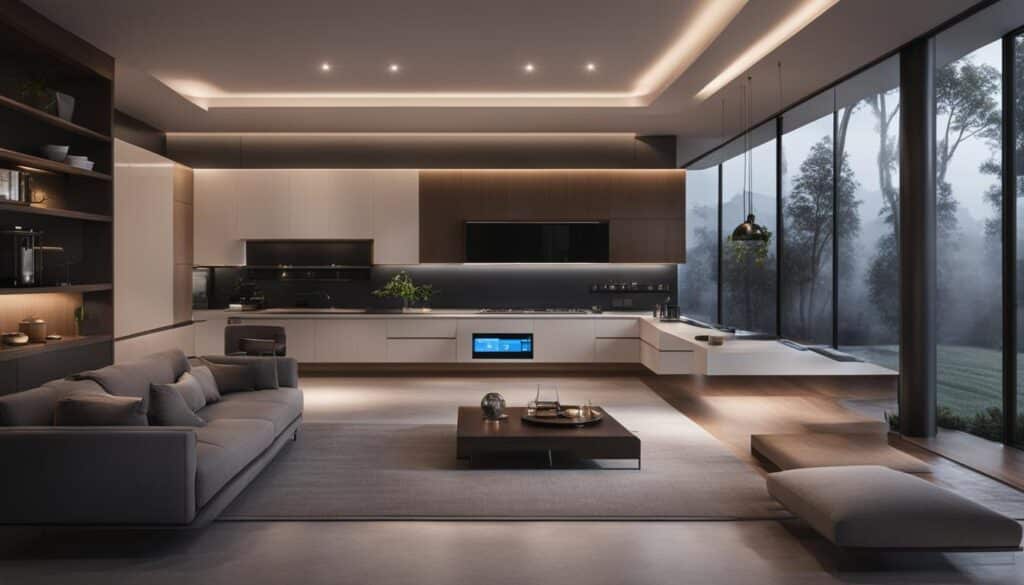
5. Streamlined Routine Automation
AI algorithms learn individual routines and automate repetitive tasks accordingly. By understanding daily habits and patterns, AI-powered home automation systems can schedule routine tasks, such as adjusting temperature settings, turning on/off lights, and managing entertainment systems.
6. Increased Comfort and Convenience
AI’s integration into home automation systems creates a more comfortable and convenient living environment. Smart homes equipped with AI technology can adjust settings based on user preferences, ensuring optimal comfort at all times.
With the help of AI, our homes become smarter, more efficient, and secure. It’s exciting to witness how AI revolutionizes home automation, enhancing our living experiences in ways we couldn’t have imagined before.
The benefits of AI in home automation extend beyond comfort and convenience. With AI’s ability to learn and adapt, smart homes become more intuitive, efficient, and secure, providing homeowners with a truly enhanced living experience.
Stay tuned for the next section where we explore how AI is reshaping the future of home automation and the exciting possibilities it holds.
How AI is Reshaping the Future of Home Automation
AI is revolutionizing the future of home automation by reshaping the way our homes operate and interact with us. With the integration of AI technologies like generative AI and voice assistants, the smart home industry is undergoing significant advancements.
Generative AI plays a crucial role in enhancing home automation. By analyzing data and learning patterns, generative AI algorithms can generate routines, automations, and even perform predictive maintenance based on the learned patterns. This takes automation to a whole new level, making our homes more intuitive and efficient.
On the other hand, voice assistants powered by AI are evolving from transactional interactions to collaborative ones. They are no longer just limited to executing commands, but they actively suggest new ways for smart homes to operate. As voice assistants continue to learn and adapt, they can provide personalized experiences and deeper integration with devices, maximizing the potential of home automation powered by AI.
AI is not only revolutionizing the present but also paving the way for an exciting future in home automation. It holds the key to creating personalized experiences, where our homes adapt to our needs and preferences seamlessly. The integration of AI technologies brings deeper integration, increased automation, and a future where our homes truly understand and anticipate our needs.
The future of home automation with AI is all about enhancing convenience, efficiency, and personalization. As AI continues to evolve, the possibilities for smart homes are limitless. Whether it’s automating mundane tasks, optimizing energy consumption, or enhancing security measures, AI is reshaping the way we interact with our homes, making them smarter and more responsive to our needs.
The Potential of AI in Future Home Automation
The potential of AI in future home automation is remarkable. With AI-powered systems and devices, our homes can provide personalized experiences tailored to our preferences. Imagine waking up to a home that has adjusted the temperature, lighting, and music to your liking, just by learning your morning routine.
Furthermore, AI has the potential to deepen the integration between devices and leverage data from various sources to create an interconnected ecosystem within our homes. This means that your smart devices, from your kitchen appliances to your home security system, can seamlessly communicate and work together to enhance your daily life.
The future of home automation with AI also holds the promise of increased automation. As AI algorithms become more sophisticated and capable of understanding our habits and preferences, our homes can autonomously anticipate and perform actions to enhance our comfort and convenience.
With AI reshaping the future of home automation, we can look forward to a world where our homes are not just connected, but truly intelligent and responsive. The possibilities are endless, and the future of home automation holds immense potential for transforming the way we live.
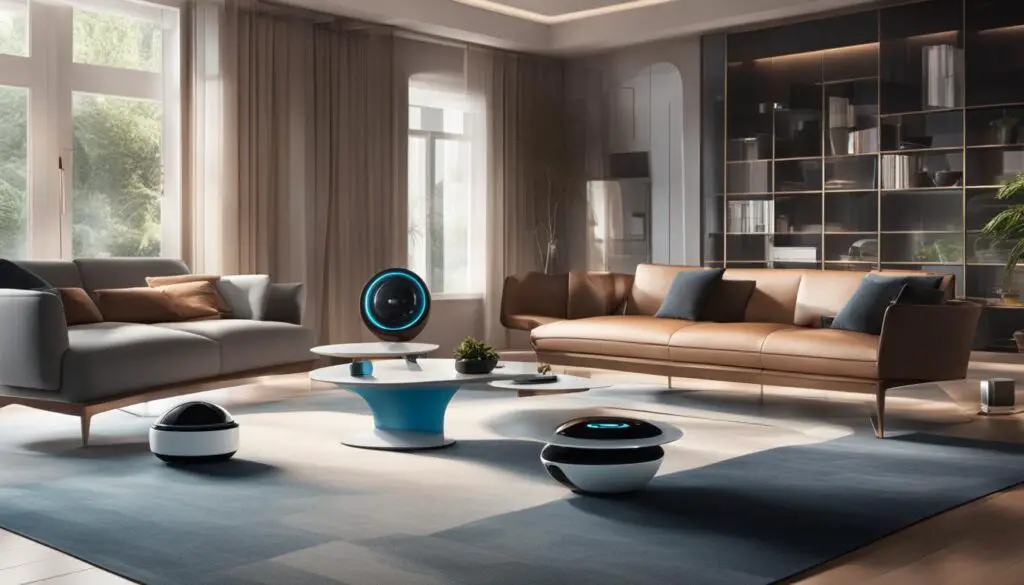
Enhancing Efficiency and Convenience with AI in Home Automation
AI plays a crucial role in enhancing the efficiency and convenience of home automation systems. By leveraging AI-powered technologies, homeowners can experience a more streamlined and personalized living environment. Here’s how AI revolutionizes home automation:
Optimizing Energy Usage for Cost Savings
AI-powered systems have the ability to learn and adapt to homeowners’ preferences, allowing them to optimize energy usage in their homes. By analyzing patterns and adjusting settings, AI algorithms ensure that energy consumption is efficient, resulting in significant cost savings and reduced environmental impact. With AI in home automation, homeowners can enjoy the convenience of a smart home while also benefiting from lower utility bills.
Simplifying Tasks through Intelligent Automation
Intelligent automation systems, driven by AI, enable hands-free control over various devices in the home. From controlling lights and temperature to managing entertainment systems, AI-powered automation makes everyday tasks simpler and more convenient. Homeowners can simply issue voice commands to their AI-powered virtual assistant, eliminating the need for manual adjustments and simplifying their routines.
“With AI-powered automation, homeowners can enjoy the convenience of a smart home while also benefiting from lower utility bills.”
Enhancing Home Security with Advanced Features
AI is transforming home security systems by offering advanced features like facial recognition and automated responses. AI-powered security cameras can detect and identify individuals, providing an added layer of safety. These systems can also send real-time alerts to homeowners’ smartphones, ensuring quick responses to potential threats. With AI in home automation, homeowners can have peace of mind knowing their homes and loved ones are protected.
Personalized User Experiences for Comfort and Convenience
One of the greatest benefits of AI in home automation is its ability to adapt to individual preferences, providing personalized user experiences. AI-powered systems can learn homeowners’ habits, adjust settings accordingly, and anticipate their needs. Whether it’s automatically adjusting the temperature before they arrive home or suggesting personalized lighting scenes, AI makes the home environment more comfortable and convenient for homeowners.
AI is revolutionizing home automation by enhancing efficiency, convenience, and security. By leveraging AI-powered technologies, homeowners can optimize energy usage, simplify tasks, enhance home security, and enjoy personalized experiences tailored to their preferences. As the future of home automation unfolds, AI will continue to play a vital role in making our homes smarter and more efficient.
Revolutionizing Household Living: AI Impact on Home Automation
AI’s impact on home automation is revolutionizing household living. With the integration of generative AI into smart home devices, homeowners can experience enhanced security footage, predictive maintenance, and proactive assistance. This advancement in AI technology brings a new level of convenience and peace of mind to homeowners.
One of the significant contributions of AI to home automation is generative AI’s capability to enhance security footage. By analyzing images and video streams in real-time, generative AI-powered cameras can detect unusual activities and alert homeowners of potential threats. This proactive approach to home security provides homeowners with an added layer of safety and protects their cherished belongings.
Furthermore, generative AI plays a crucial role in predictive maintenance, ensuring the smooth operation of smart home devices. By analyzing usage patterns, generative AI algorithms can anticipate the maintenance needs of devices and provide timely alerts to homeowners. This proactive maintenance approach helps prevent unexpected device failures, minimizing inconvenience and costly repairs.
Generative AI enables proactive maintenance by analyzing usage patterns and providing timely alerts to homeowners.
Moreover, voice assistants powered by generative AI are making smart homes collaborative and intelligent. These voice assistants can suggest new automation possibilities based on homeowners’ preferences and routines, facilitating a more seamless and intuitive living experience. By leveraging generative AI, voice assistants become valuable partners, guiding homeowners in maximizing the potential of their smart home devices.
In addition to security and convenience, AI technology optimizes heating, ventilation, and air conditioning (HVAC) systems in smart homes. By combining user patterns and environmental factors, AI algorithms can automate HVAC systems to provide optimal comfort and energy efficiency. Homeowners can enjoy personalized climate control, saving energy and reducing costs without compromising comfort.
AI’s Impact on HVAC Systems
| Benefits of AI in HVAC Systems | Examples |
|---|---|
| Energy Efficiency | AI algorithms optimize temperature settings based on user preferences and environmental conditions, reducing energy consumption. |
| Comfort | AI-enabled HVAC systems automatically adjust temperature, humidity, and airflow to maintain a comfortable living environment. |
| Cost Savings | By optimizing energy consumption, AI-powered HVAC systems help homeowners reduce utility bills and save money in the long run. |
As the smart home industry continues to evolve, the potential of generative AI in household living expands. The introduction of interoperability standards, such as Matter, enables seamless integration between devices and platforms, creating a personalized smart home experience. This interoperability opens up a world of possibilities, allowing homeowners to customize their automation routines and experience the full potential of AI-powered home automation.
Overall, the impact of AI on home automation is profound. By integrating generative AI into smart home devices, AI revolutionizes household living by enhancing security, streamlining maintenance, and creating personalized and energy-efficient living spaces. The future of home automation with AI is poised to bring even more advancements, making our homes more intelligent, convenient, and comfortable than ever before.
How Artificial Intelligence is Reshaping the Future of Home Automation
Artificial Intelligence (AI) is playing a transformative role in the future of home automation, with advancements in AI tools revolutionizing the way we interact with our smart homes. From chatbots to generative AI, these technologies are reshaping the way we live and interact with our homes.
AI-powered chatbots have become ubiquitous in the media and are now integral to many AI projects. Leveraging natural language processing and machine learning algorithms, chatbots provide intelligent, automated responses to user queries and commands. Their presence in the smart home ecosystem enhances convenience and streamlines communication, creating an intuitive and frictionless home automation experience.
Generative AI, on the other hand, is taking home automation to new heights by making our homes more efficient and giving homeowners back valuable time. With generative AI algorithms, smart homes can learn and adapt to user preferences, creating personalized automation routines that align with individual needs and lifestyles. Whether it’s adjusting the thermostat based on user patterns or automatically dimming the lights to create ambiance, generative AI optimizes our living environments for comfort and efficiency.
AI technology is not new to the smart home landscape. Devices like smart speakers and security systems already incorporate AI features and capabilities. However, the integration of AI into home automation systems holds immense potential for enhancing efficiency, convenience, and personalization. AI algorithms can analyze vast amounts of data from connected devices, enabling proactive automation based on learned patterns and user preferences. The result is a truly intelligent home that anticipates our needs and adapts to our lifestyles.
“With AI-powered chatbots, smart homes become more intelligent and responsive, providing personalized experiences and simplifying daily routines. Combining this with generative AI’s ability to create tailored automation routines, the future of home automation is poised for unprecedented efficiency, convenience, and personalization.”
The Future of AI in Home Automation
The future of home automation with AI holds exciting prospects. As AI technology continues to advance, we can expect even greater integration with everyday appliances, expanded capabilities for energy management, and enhanced collaboration with voice assistants.
Energy Management: AI algorithms will play a crucial role in optimizing energy consumption in smart homes. By analyzing user behavior, environmental factors, and energy prices, AI-powered systems can automatically adjust settings to minimize energy usage and reduce costs. Homeowners will enjoy increased efficiency and sustainability while contributing to a greener future.
Voice Assistants: Voice assistants, powered by AI, are becoming more than just virtual assistants. They are evolving into collaborative partners in our homes, suggesting new automation possibilities and actively engaging with us. The future of voice assistants in home automation holds the promise of seamless and natural interactions between humans and technology.
Enhanced Personalization: AI will continue to enable personalization in home automation, ensuring that our living spaces adapt to our unique preferences and needs. Whether it’s adjusting the lighting based on individual preferences or creating tailored experiences for different family members, AI algorithms will create truly personalized smart homes.
Health and Wellness Integration: AI’s impact on home automation will extend to our health and wellness. From monitoring and analyzing sleep patterns to suggesting healthy recipes based on dietary preferences, AI-powered systems will ensure our homes support and enhance our well-being.
With AI reshaping home automation, the future holds immense potential for more efficient, convenient, and personalized living spaces. By embracing AI technologies, homeowners can create intelligent homes that enhance their well-being, conserve resources, and simplify daily tasks. The future of home automation is here, and it’s powered by Artificial Intelligence.
| Future Trends in AI-Powered Home Automation | Key Features |
|---|---|
| Smart Home Energy Management | AI algorithms optimize energy consumption, leading to efficient resource usage and cost savings. |
| Voice Assistant Integration | Voice assistants evolve to become collaborative partners, suggesting new automation possibilities and engaging in seamless interactions. |
| Enhanced Personalization | AI algorithms tailor automation routines to individual preferences, creating personalized smart home experiences. |
| Health and Wellness Integration | AI-powered systems monitor health metrics, suggest healthy habits, and create a supportive environment for well-being. |
Conclusion
Smart home automation has been revolutionized by the incorporation of AI technology, resulting in homes that are smarter, more efficient, and more convenient than ever before. By harnessing the power of AI-powered systems and devices, homeowners can optimize energy consumption, enhance security, and enjoy personalized experiences tailored to their individual preferences.
The future of home automation with AI holds tremendous potential, with possibilities for increased personalization, seamless integration of health and wellness features, and further integration with everyday appliances. As AI technology continues to advance, the smart home industry will evolve to provide homeowners with even more intelligent and intuitive living environments.
Embracing AI in home automation translates to elevated levels of comfort, enhanced efficiency, and peace of mind for homeowners. With AI-powered systems, everyday tasks are streamlined and energy usage is optimized, leading to cost savings and eco-friendly living. The integration of AI brings greater convenience and control to homeowners, allowing them to manage their homes with ease and efficiency.
In conclusion, the advent of AI in smart home automation has revolutionized the way we live, providing us with a seamless and personalized living experience. As technology continues to advance, the possibilities for AI in home automation are endless, offering homeowners a future of smart living that is efficient, convenient, and tailored to their needs.
FAQ
What is the role of AI in home automation advancements?
AI plays a crucial role in home automation advancements by revolutionizing the way we interact with our homes. It enhances convenience, security, and energy management through AI-powered virtual assistants, optimized algorithms, and personalized experiences.
How is AI growing in smart home automation?
The growth of AI in smart home automation is driven by the increasing number of connected devices and the integration of AI-powered virtual assistants. AI technology makes home automation more intuitive, personalized, and efficient, offering homeowners enhanced control and convenience over their connected devices.
What are the benefits of AI in home automation?
AI brings numerous benefits to home automation, including personalized experiences, hands-free control over smart devices, optimized energy usage, enhanced security features, and overall comfort and convenience for homeowners.
How is AI reshaping the future of home automation?
AI is reshaping the future of home automation through advancements in technologies like generative AI and voice assistants. Generative AI enhances automation routines, predictive maintenance, and security footage. Voice assistants suggest new automation possibilities, making smart homes more collaborative and personalized.
How does AI enhance efficiency and convenience in home automation?
AI enhances efficiency and convenience in home automation by learning and adapting to homeowners’ preferences. It optimizes energy usage, provides hands-free control over devices, streamlines routines, and offers advanced security features like facial recognition and automated responses.
What is the impact of AI on household living through home automation?
AI’s impact on household living through home automation is revolutionizing everyday life. Generative AI enhances security, provides predictive maintenance, and offers proactive assistance. AI technology optimizes heating, ventilation, and air conditioning systems, creating a personalized smart home experience.
How is artificial intelligence reshaping the future of home automation?
Artificial intelligence is reshaping the future of home automation by integrating AI tools like chatbots and generative AI. Chatbots dominate media and have become integral to many AI projects. Generative AI makes homes more efficient, saving homeowners valuable time. The integration of AI into home automation offers immense potential for enhancing convenience, efficiency, and personalization.
How does AI revolutionize home automation?
AI revolutionizes home automation by making homes smarter, more efficient, and more convenient. By leveraging AI-powered systems and devices, homeowners can optimize energy usage, enhance security, enjoy personalized experiences, and create an intelligent and intuitive living environment.




